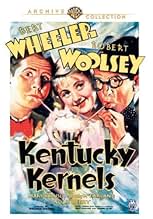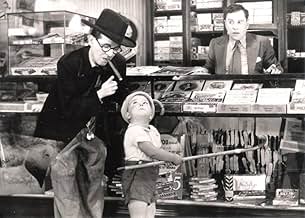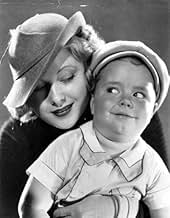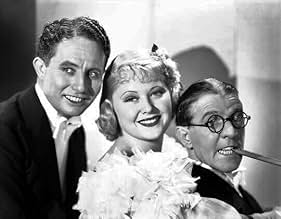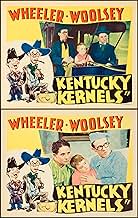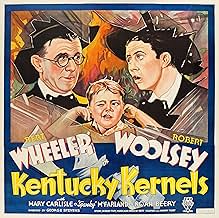Dos magos desempleados ayudan a Jerry a adoptar a Spanky. Jerry se fuga y les deja al niño. Spanky hereda una fortuna, van a Kentucky y quedan atrapados entre familias rivales.Dos magos desempleados ayudan a Jerry a adoptar a Spanky. Jerry se fuga y les deja al niño. Spanky hereda una fortuna, van a Kentucky y quedan atrapados entre familias rivales.Dos magos desempleados ayudan a Jerry a adoptar a Spanky. Jerry se fuga y les deja al niño. Spanky hereda una fortuna, van a Kentucky y quedan atrapados entre familias rivales.
- Dirección
- Guionistas
- Elenco
George 'Spanky' McFarland
- Spanky Milford
- (as 'Spanky' McFarland)
Lucille La Verne
- Aunt Hannah Milfor
- (as Lucille LaVerne)
Willie Best
- Buckshot
- (as Sleep 'n' Eat)
Harry Bernard
- Destitute Man
- (sin créditos)
Edgar Dearing
- Policeman
- (sin créditos)
Jack A. Goodrich
- Double
- (sin créditos)
William Gould
- One of the Milfords
- (sin créditos)
Dorothy Granger
- Ethel - Baxter's Secretary
- (sin créditos)
Opiniones destacadas
Bert Wheeler and Robert Woolsey were one of many comedy teams to make it big during the early sound era. But unlike Laurel and Hardy or the Marx Brothers, their fame has not endured and their movies are not widely available today. Kentucky Kernels is a rare chance to see them at their prime.
The story and screenplay are by Bert Kalmar and Harry Ruby, the same duo who wrote many of the Marx Brothers' early hits, including Animal Crackers and Duck Soup. The fact that Kentucky Kernels features a slightly more conventional brand of humour shows how much of an influence the Marx Brothers had over their appearances. The early Marx Brothers comedies barely had any kind of story at all, because Groucho et al had such wild personalities they overshadowed the logic of plotting. By contrast Wheeler and Woolsey have slightly less exuberant comic personas and are able to work inside someone else's story. This is not a condemnation of the pair, simply an explanation of their difference in style.
Comparisons can be drawn however with other comedians of the era. Robert Woolsey has a little of Groucho in his wisecracking delivery, but also a touch of dour character actor Ned Sparks. Woolsey makes much play of his spectacles and his ever-present cigar, working these props into his aloof, confident comedy creation. Wheeler is more of the straight man, with some of the incompetent and effeminate qualities of Stan Laurel. However he is outwardly normal enough to take the part of a romantic lead in Kentucky Kernels. They are not a bad pairing, although they don't have quite the same dynamic as many of the more famous double acts.
The director for Kentucky Kernels was George Stevens, a graduate from the Hal Roach studios who would later make some very fine pictures. From the rather arty opening shots, it's clear Sevens had a burning desire to be a dramatic director. Stevens, a former cinematographer, had also worked informally as gag-man for Roach and there's no doubt he was a very funny man, but he was never actually that great a comedy director. As he always would, he doesn't stick to wide shots where you can see everything going on, and works a lot in close-up. It's a style that would work very well for him later on, but it doesn't lend itself very well to movies of this sort, as the comedy business becomes too disjointed.
The reason for Wheeler and Woolsey's lack of contemporary fame has been blamed on a number of things, a commonly cited example being their pictures not being reprised on TV in the 50s. However, it seems they weren't exactly phenomenally popular in the first place. Pictures like Kentucky Kernels would do a healthy trade, but they wouldn't get queues round the block. But all comparisons aside, this is still a fairly funny little movie. Our Gang member "Spanky" MacFarland pulls a number of cute and amusing poses. Noah Beery, a hammy version of his brother Wallace, is great fun here. Whether it comes from the writers Ruby and Kalmar, the ideas of cast members or the director, there is a cartoonishness to the humour that keeps things suitably silly. And, even though they may have been a somewhat second-rate pairing, Wheeler and Woolsey are able to provide us with a good many laughs.
The story and screenplay are by Bert Kalmar and Harry Ruby, the same duo who wrote many of the Marx Brothers' early hits, including Animal Crackers and Duck Soup. The fact that Kentucky Kernels features a slightly more conventional brand of humour shows how much of an influence the Marx Brothers had over their appearances. The early Marx Brothers comedies barely had any kind of story at all, because Groucho et al had such wild personalities they overshadowed the logic of plotting. By contrast Wheeler and Woolsey have slightly less exuberant comic personas and are able to work inside someone else's story. This is not a condemnation of the pair, simply an explanation of their difference in style.
Comparisons can be drawn however with other comedians of the era. Robert Woolsey has a little of Groucho in his wisecracking delivery, but also a touch of dour character actor Ned Sparks. Woolsey makes much play of his spectacles and his ever-present cigar, working these props into his aloof, confident comedy creation. Wheeler is more of the straight man, with some of the incompetent and effeminate qualities of Stan Laurel. However he is outwardly normal enough to take the part of a romantic lead in Kentucky Kernels. They are not a bad pairing, although they don't have quite the same dynamic as many of the more famous double acts.
The director for Kentucky Kernels was George Stevens, a graduate from the Hal Roach studios who would later make some very fine pictures. From the rather arty opening shots, it's clear Sevens had a burning desire to be a dramatic director. Stevens, a former cinematographer, had also worked informally as gag-man for Roach and there's no doubt he was a very funny man, but he was never actually that great a comedy director. As he always would, he doesn't stick to wide shots where you can see everything going on, and works a lot in close-up. It's a style that would work very well for him later on, but it doesn't lend itself very well to movies of this sort, as the comedy business becomes too disjointed.
The reason for Wheeler and Woolsey's lack of contemporary fame has been blamed on a number of things, a commonly cited example being their pictures not being reprised on TV in the 50s. However, it seems they weren't exactly phenomenally popular in the first place. Pictures like Kentucky Kernels would do a healthy trade, but they wouldn't get queues round the block. But all comparisons aside, this is still a fairly funny little movie. Our Gang member "Spanky" MacFarland pulls a number of cute and amusing poses. Noah Beery, a hammy version of his brother Wallace, is great fun here. Whether it comes from the writers Ruby and Kalmar, the ideas of cast members or the director, there is a cartoonishness to the humour that keeps things suitably silly. And, even though they may have been a somewhat second-rate pairing, Wheeler and Woolsey are able to provide us with a good many laughs.
If you only know the little bruiser Spanky McFarland from his Litlte Rascals, this movie casts some light on why he was considered one of the best child actors of his generation. As an adorable little tyke with a penchant for breaking glass, he drives the movie's Kentucky feud storyline. He even signs a love song "One Little Kiss," to his best pal -- a cute dog, and one of the male leads sings a few lines to a donkey (It's that kind of movie).
Kentucky Kernels is notable for showing what was considered funny -- and in some cases, socially acceptable -- in 1934. An actor credited as "Sleep n Eat" (actually Willie Best) shuffles his way through the film as a stereotypical wide-eyed, scared-of-his-shadow servant. And a gay subtext between the two male leads is watered down by some forced and unconvincing romance with a typical blonde Southern belle, but lots of the movie's humor is derived from the male/male "romance." In their first scene, for example, Bert Wheeler and Robert Woolsey are the picture of domestic bliss -- bickering as one sits at the dinner table while the other does dishes and complains about his dishpan hands. Though they mince their ways through the rest of the movie, even holding hands at times, the characters are presented as heterosexual. At another point, they're shown sleeping in the same bed -- in a plantation mansion that surely had plenty of bedrooms.
The plot, with the boys finding themselves in the middle of a Hatfileds and McCoys-style Kentucy feud, is a bit contrived. Lines like "You dance exactly like a heifer -- I mean a zephyr!" seem lifted from the Marx Brothers, and in fact one of the supporting players is best known for her appearances as the straight woman in some Marx classics. Margaret Dumont plays the manager of an adoption agency that places young Spanky, indirectly, in the care of the vaudeville performers played by Wheeler and Woolsey. It's a shame Dumont wasn't given a more substantial part; she would have been terrific as a befuddled Southern matriarch later in the film.
The paper-thin plot won't really hold your attention, but viewed as a "film history" lesson, it's worth watching. Director George Stevens went on to much bigger and better things (including the enormous classic, Giant, also set in the South), so it's interesting to see how he handled this dull script.
Kentucky Kernels is notable for showing what was considered funny -- and in some cases, socially acceptable -- in 1934. An actor credited as "Sleep n Eat" (actually Willie Best) shuffles his way through the film as a stereotypical wide-eyed, scared-of-his-shadow servant. And a gay subtext between the two male leads is watered down by some forced and unconvincing romance with a typical blonde Southern belle, but lots of the movie's humor is derived from the male/male "romance." In their first scene, for example, Bert Wheeler and Robert Woolsey are the picture of domestic bliss -- bickering as one sits at the dinner table while the other does dishes and complains about his dishpan hands. Though they mince their ways through the rest of the movie, even holding hands at times, the characters are presented as heterosexual. At another point, they're shown sleeping in the same bed -- in a plantation mansion that surely had plenty of bedrooms.
The plot, with the boys finding themselves in the middle of a Hatfileds and McCoys-style Kentucy feud, is a bit contrived. Lines like "You dance exactly like a heifer -- I mean a zephyr!" seem lifted from the Marx Brothers, and in fact one of the supporting players is best known for her appearances as the straight woman in some Marx classics. Margaret Dumont plays the manager of an adoption agency that places young Spanky, indirectly, in the care of the vaudeville performers played by Wheeler and Woolsey. It's a shame Dumont wasn't given a more substantial part; she would have been terrific as a befuddled Southern matriarch later in the film.
The paper-thin plot won't really hold your attention, but viewed as a "film history" lesson, it's worth watching. Director George Stevens went on to much bigger and better things (including the enormous classic, Giant, also set in the South), so it's interesting to see how he handled this dull script.
Willie Doyle (Bert Wheeler) and Elmer Dugan (Robert Woolsey) are out-of-work magicians. They are The Great Elmer and Company. They help Jerry Bronson adopt Spanky Milford, but Jerry elopes with his girlfriend leaving Spanky behind with the two magicians. Then they are told that Spanky has inherited a large estate. The trio head out to Banesville, Kentucky. At the train station, Willie and fellow passenger Gloria Wakefield (Mary Carlisle) fall for each other. Unbeknownst to the guys, the Milfords and Wakefields are embroiled in a generational blood feud.
Initially, I am amused by Wheeler and Woolsey and the kid. The kid is a bit too bratty and not quite cute enough. The glass breaking is a funny gag at first, but it gets more annoying over time. The guys never really get beyond mildly amusing. I don't hate these guys, but I'm not really laughing either.
Initially, I am amused by Wheeler and Woolsey and the kid. The kid is a bit too bratty and not quite cute enough. The glass breaking is a funny gag at first, but it gets more annoying over time. The guys never really get beyond mildly amusing. I don't hate these guys, but I'm not really laughing either.
Kentucky Kernels is another Wheeler/Woolsey comedy, where they decide to adopt Spanky (the same Spanky McFarland from the "Our Gang" show.) They go down south to visit the Colonel (Noah Beery) and Aunt Hannah ( Lucille LaVerne ) and meet up with the lovely Gloria Wakefield (Mary Carlisle) and the feuding Milfords. The plot is kind of all over the place, but we do get a good dose of Wheeler and Woolsey's standup comedy act along the way. Cast includes Willie Best ( Sleep N Eat ) as Buckshot; Director George Stevens sure did some of the great ones (A Place in the Sun, Diary of Anne Frank, Gunga Din). Some other interesting film connections - Viewers will spot Margaret Dumont (as Mrs. Baxter, head of the Children Welfare League), who made all those movies with the Marx Brothers. Writers Kalmar and Ruby had also written material for the Marx Brothers. Also, Mary Carlisle and Noah Beery's brother Wallace were both in Grand Hotel in 1932. Fun comedy, but pretty wacky and zany. Made at the beginning cusp of the production code in 1934, there are quite a few scenes and jokes that show two men are living together, sleeping in the same bed, keeping house, and adopting a child... pretty far ahead of its time!
Always enjoy Wheeler & Woolsey, even if their movie output is uneven; some are very funny, some are not so. I thought this one was pretty funny and that it succeeds due to the professional direction of George Stevens.
It is old-fashioned in that much of the humor consists of what must be old corny vaudeville jokes, sight gags and outrageous puns, all of which might not go over with today's audiences. Speaking for myself I can appreciate such antiquated antics, and I can also put into context outdated racial humor, such as found here in Willie Best's character. He plays his usual slow-talking, pop-eyed servant ("feets, do yo' duty!") by which he became famous.
Spanky McFarland was always a cute little kid and doesn't disappoint here. And this maybe the only time Noah Beery,Sr. sings on screen, and takes a turn along with everybody else singing a Kalmar-Ruby song "One Little Kiss", a very tuneful number written for this picture. Some reviewers take issue with the inane plot, about two feuding Kentucky families, but c'mon, folks. It's just a Wheeler & Woolsey comedy; were you expecting Ingmar Bergman?
It is old-fashioned in that much of the humor consists of what must be old corny vaudeville jokes, sight gags and outrageous puns, all of which might not go over with today's audiences. Speaking for myself I can appreciate such antiquated antics, and I can also put into context outdated racial humor, such as found here in Willie Best's character. He plays his usual slow-talking, pop-eyed servant ("feets, do yo' duty!") by which he became famous.
Spanky McFarland was always a cute little kid and doesn't disappoint here. And this maybe the only time Noah Beery,Sr. sings on screen, and takes a turn along with everybody else singing a Kalmar-Ruby song "One Little Kiss", a very tuneful number written for this picture. Some reviewers take issue with the inane plot, about two feuding Kentucky families, but c'mon, folks. It's just a Wheeler & Woolsey comedy; were you expecting Ingmar Bergman?
¿Sabías que…?
- Trivia"RKO" borrowed George 'Spanky' McFarland from "Hal Roach Studios" for this film.
- ConexionesFeatured in Hollywood the Golden Years: The RKO Story: Birth of a Titan (1987)
- Bandas sonorasOne Little Kiss
(1934) (uncredited)
Written by Bert Kalmar, Harry Ruby
Performed by Bert Wheeler, Noah Beery, George 'Spanky' McFarland,
Robert Woolsey, Mary Carlisle and negro servants
Selecciones populares
Inicia sesión para calificar y agrega a la lista de videos para obtener recomendaciones personalizadas
Detalles
- Fecha de lanzamiento
- País de origen
- Idioma
- También se conoce como
- Kentucky Corn
- Locaciones de filmación
- Productora
- Ver más créditos de la compañía en IMDbPro
- Tiempo de ejecución1 hora 15 minutos
- Color
- Relación de aspecto
- 1.37 : 1
Contribuir a esta página
Sugiere una edición o agrega el contenido que falta

